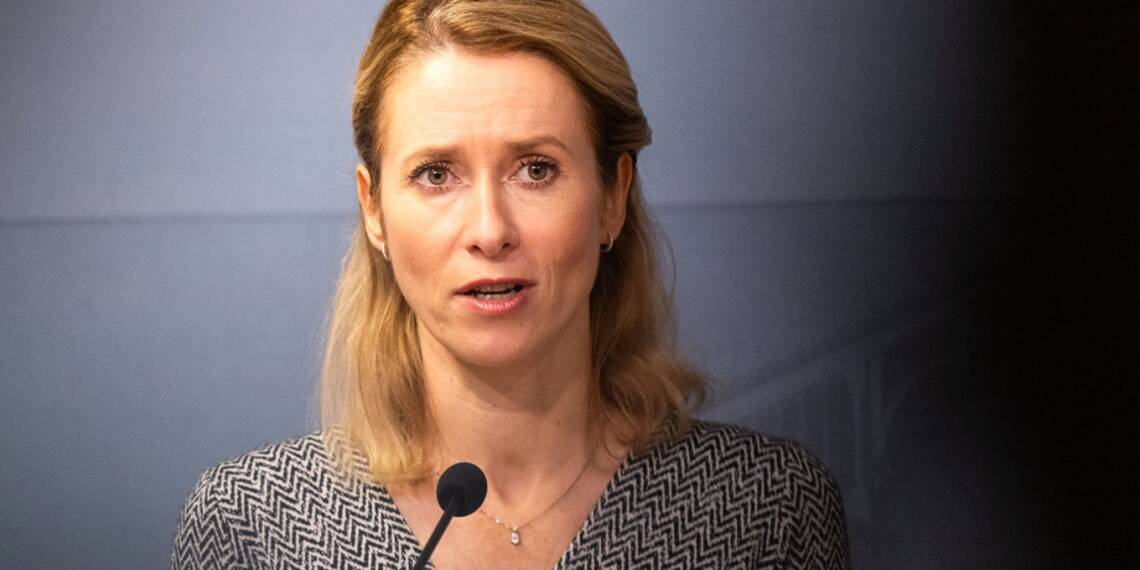Russia has initiated a criminal investigation into Estonian Prime Minister Kaja Kallas and Secretary of State Taimar Peterkop, leading to the issuance of arrest warrants. The investigation revolves around their involvement in the dismantling of Soviet WWII memorials within Estonia. In 2022, Kallas publicly declared the Estonian government’s decision to swiftly eliminate all Soviet symbols from public spaces.
This move aligns with the broader trend observed in Estonia, as well as neighboring Latvia and Lithuania, where there has been a growing focus on the removal of Soviet-era war monuments. The rationale behind such actions is often framed as an effort to eradicate symbols associated with the Soviet occupation. This anti-Soviet campaign has gained momentum, particularly since Russia’s military intervention in Ukraine that began in February 2022.

Join us on Telegram: https://t.me/tfiglobal
According to TASS on Tuesday, unnamed Russian security officials confirmed that a “criminal case has been launched against Estonia’s Prime Minister Kaja Kallas and Secretary of State Taimar Peterkop over the destruction and damage of memorials to Soviet warriors.”
Kallas asserted in August 2022 that the presence of remaining Soviet monuments in Estonia served as a reminder of historical “wounds,” particularly in light of Russia’s actions in Ukraine, necessitating their removal.
Kremlin spokesperson Dmitry Peskov criticized the Estonian government, accusing them of engaging in a “war with a common history.” “Getting rid of monuments is outrageous and does not make any nation, including Estonia, look better,” he added.
Under Kallas’s leadership, Estonia has become a steadfast supporter of Ukraine, committing to provide €1.2 billion ($1.3 billion) in aid to Kiev by 2027. In January, Estonia, along with Latvia and Lithuania, announced plans to establish a defense line along their borders with Russia and Belarus, with Tallinn proposing the construction of around 600 bunkers.
Read More: EU’s Rule of Law Witch Hunt: Greece Under Fire!
In August of the previous year, Kallas faced calls for her resignation when it was revealed that her husband, Arvo Hallik, held a 25% stake in a logistics company offering services in Russia. Despite public insistence on halting all business with Russia until the resolution of the Ukraine conflict, Kallas resisted stepping down, withstanding pressure from both the Estonian president and opposition.
Estonia, Latvia, and Lithuania were part of the Russian Empire throughout the 19th century but declared independence following the 1917 revolution. The Soviet Union incorporated these states with the assistance of local communists during World War II. Subsequently occupied by Nazi Germany, the territories were later liberated by Soviet forces, leading to their inclusion in the USSR until gaining independence in 1991.
And now, Kaja Kallas, known for her critical stance towards Russia, is reportedly a favored candidate among some EU diplomats for the position of High Representative of the Union for Foreign Affairs and Security Policy, potentially succeeding Spain’s Josep Borrell. This information, reported by Politico EU on Thursday, is sourced from anonymous diplomats who consider Kallas part of a hypothetical “dream team” of women to lead the European Union after the upcoming European Parliament elections in June.
Read More: Ursula is making a dangerous mistake with Hungary
The envisioned lineup includes Danish Prime Minister Mette Frederiksen as the new chair of the European Council, Ursula von der Leyen of Germany as the head of the European Commission, and Roberta Metsola of Malta continuing in the role of chair of the European Parliament. “It’s my dream team,” a diplomat who requested anonymity in order to speak freely told Politico. “It would send such a strong message.”

Estonian Prime Minister Kaja Kallas is gaining prominence in discussions within the European Union, particularly in light of the Ukraine conflict. She has expressed interest in succeeding Jens Stoltenberg as NATO Secretary-General. Kallas faced calls for resignation in August, linked to her husband’s stake in a Russian-operating shipping company despite EU sanctions. Despite this, she affirmed her commitment to remaining in power for the freedom of Ukraine and Estonia.
The speculated “dream team” arrangement aims to distribute leadership posts geographically and politically within the EU. This proposal includes former European Council President Donald Tusk as the prime minister of Poland.
Read More: Ursula Von Der Leyen CAN lose her job
Notably, the suggested allocation of leadership roles aligns with political dynamics, with the European People’s Party overseeing the Commission and the Parliament, socialists leading the Council, and liberals controlling the External Action Service.
Kallas’s anti-Russian stance, manifested through the removal of Soviet monuments in Estonia and her steadfast support for Ukraine, has not only triggered a criminal investigation from Russia but has also positioned her as a key figure in discussions about EU leadership as anti-Russian sentiment is always favored by the EU.








